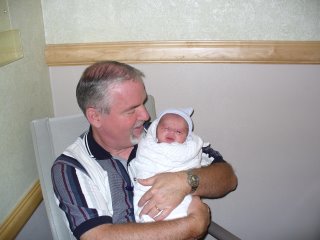An idea hatchery.
Exploring ideas dreamt, written, and lived. Diversely concerned with Invention, Literature, Music, Psychology/Sociology, Service, Communication, Art, Journalism, Resource Mangagement, Film, and Story.
Distinct from flannco.worpress.com
Tuesday, June 27, 2006
Lana Grace Flannery and a baby girl's grip on your heart


Much apologies for the delay in communication.
Lana Grace Flannery was born to Brian and Christa Flannery at 4:08 PM
on Thursday, June 22, four days before she was due. Mother and child
are healthy and doing well. We escaped Denver's Exempla Saint Joseph
Hospital around 5:00 PM on Saturday. Brian is taking some time off
of work. Since we've been home, we're getting better at changing
diapers and sleeping during the night.
I have attached pictures to make the ladies say "awww." The files
are smaller than the camera takes them but large enough to see (just
right for email). Further messages will follow. Send in your vote
for the cutest one. If she looks yellow, she's slightly jaundiced
but healthy (a nurse stopped by this morning to assure us so). If
she looks red, I left her out in the sun a little too long (smells
like lotion and barbecue).
It's incredible - she's growing so fast; she's getting so strong.
She's already lifting up her head - something she shouldn't be able
to do yet. She drove us home from the hospital - not sure she's
supposed to be doing that yet. She likes to look you in the eyes.
She kicks and wriggles constantly. We put her to sleep on her back
but she finds her way onto her belly, contrary to the advice of the
entire medical profession. She says she wants an eskimo for
Christmas.
-Brian and Christa Flannery


Monday, June 26, 2006
Don't let us get sick
Don't let us get old
Don't let us get stupid, all right?
Just make us be brave
And make us play nice
And let us be together tonight
The Difficulty of Correspondence (Why I Don't Blog)
We regularly spend that time, gas, and money to be with the people we prefer so long as they are in town. As soon as they are out of proximity or out of the metropolitan area, the relationship depends on phone calls and emails and the almost extinct written correspondence. Then only the strongest friendships survive with great effort towards their maintenance. The good friendships lie dormant, waiting to resume as soon as the person bounds into our life again. The difficult friendships slowly wither.
Even with friends in town, you start to know the buddy down the block far better than the best friend who lives a city and a rush hour away. You can try to triangulate and centralize, keep all your friends and relations within commuting distance, but sometimes a job or a house or a spouse or new friends land you in a strange and distant land. States or continents away, or no farther than a highway, you have to start over with new friends and even new family.
Distance is more than geography. Things can separate you from friends and family that have nothing to do with where you are located or who is nearby. Not all of these things are bad. Sometimes getting a job, getting married, or having children can change who you see and talk to everyday. Sometimes the distance of circumstance divides people without changing anything else. Growing closer to new neighbors, new coworkers, a new spouse (and the requisite in-laws), or a child or children might mean letting a few old relationships rest or sag.
So when you can't keep in touch with everyone, you chose who and when to reach and love. I am terrible at email. I am terrible at writing letters. I rarely take advantage of free long distance calling even though it's one of my cell phone's selling points. I don't diary or journal - never been that consistent at interacting with myself. Newsgroups, blogs, wikis, the new wave of organizing and distributing information, same old habits. Correspondence, electronic or otherwise, gets done when it has to and with whom it has to. My family at the top, my old friends at a slight distance next alongside my new friends nearby.
All my people across town, across the world, or at a far away enough stage of life, hear from me rarely and when they do, they hear about my affection and my regret for not being there more. If they are normal human beings with the same balance between proximity and correspondence, they understand that delay and scarcity of communication doesn't measure my esteem for them. I may love them more than my friends, but no more than my family, and I would never trade my spot of intimacy, my attention to a wife and a baby.
So everybody's waiting for Heaven, that great Holiday Reunion in the Sky, when everyone we wished could be near is restored to us and we all sit down at one big table and eat and smile and laugh at all the stories we haven't gotten to tell yet.
With that assurance, we don't have to wait until then. Although nothing could compare, down here in the mud, we do get glimpses. Besides the happy surprises, the family get-togethers, the 50th birthday parties and silver or gold wedding anniversaries, the school reunions and old friend barbecues: Besides those, we can promote and harbor these collisions of good people. We can defy the distance of space and time and even the bizarre removal that life circumstances cause. In some small, partial way, we can anticipate the kind of feast where everyone has a chair at the table.
That's what Flannery Amalgamated is all about.
Friday, June 09, 2006
FlannCo Technological Innovations
Ways to handle the chaotic data surplus wrought by the information revolution. How to tame the limited and fickle nature of computers to exploit their unlimited potential.
More
A department of Flannery Amalgamated.
(From tamethemachines.blogspot.com 1/1/2004)
FlannCo Tech. Innovations: The Problem of Too Much
The advent of the computer and digital media began an era often lauded as the Digital Age or the Information Age. This Information Revolution made countless advances in medicine, science, art and communication possible. It has never been easier to find, create, duplicate and organize information. In fact, it has become so easy to copy and distribute data that the amount of available information has become a problem of its own. Piracy and other forms of illegitimate duplication have exasperated software companies and the recording industry. Violation of privacy and the wide-spread availability of personal details have alarmed others. While these are valid issues, the biggest problem is not malicious, intentional or even illegal. The sheer volume of information in existence is overwhelming the resources of man and machine.
Information Overload
This problem increases constantly as does the amount of data that demands attention, decision and storage. The average person doesn't know what to do with the barrage of knowledge that flows into our lives from printed or broadcast media, not to mention the internet. To cope, many learn to ignore most of it. The stream of freshly ignored data piles atop previously ignored data. Such a mess of information soon outgrows its usefulness and disappears into the void of digital Ether. What actually makes it into an archive or backup will be unreadable in a short time due to the changing nature of data formats and the programs that access them. Interesting or urgent information is discovered too late and important or valuable information is lost forever.
Solutions
The problem has been addressed before. Some suggest rationing the intake of information, scheduling and budgeting data. Others have developed more complex and even more automated methods for organizing and prioritizing information. Others favor the abandonment of the whole mess -- kill your television, clear out, and live on renewable energy sources in the mountains. I do not favor giving up. I applaud efforts to balance information with other aspects of life. I am interested in surplus management tools for information but I leave all of these for another time. For now, I want to consider the nature of information and computer data in particular. Don't worry, I have no interest in profound philosophies or words like "epistemology" and "ontology." Not yet. There is already a field of study called Information Theory but I am approaching the subject afresh. I will refer to the established theories in more scholarly notes and relate my experiments and deductions to them there as well.
(From tamethem.blogspot.com 3/21/2004)
The Idea: FlannCo Technological Innovations
Ever wish you could trust it to keep your information safe and orderly?
Wonder when all those dreams of computers that understand you and respond to your commands will come true?
Well, stop daydreaming, bub. Now is the time. The revolution is at hand.
It’s time we stopped spending hours learning how to work with these machines. It’s time for them to start working for us, rather than the other way.
For the first time in the history of the world, Mankind has created a machine capable of reason, of logic, and of thought (loosely). These machines can be added to and improved upon far easier than any prior mechanical invention. Most of the time, changes can occur without physical modification, at least without bothering humans to perform the modifications. All people need to do is tell these machines what they want them to do and they handle the underlying details.
That's their magic: that learning, that scalability that automates low-level processes in favor of presenting high-level, nearly intelligent, interfaces for their human operators. They have come from requiring relays, switches and cables to be manually set to needing cryptic numerical information on punch cards. Then they didn't need the punch cards. Then we taught them to respond to more versatile assembly code that could work on more than one machine and was more humanly understandable. Then we taught them increasingly complex languages to do increasingly complex tasks and present themselves at our service more readily. Now we have graphical user interfaces, pointing devices, voice input, communication between computers over distances long or short, files that can be accessed from anywhere, even a little annoying helper paperclip animation that taps on your screen when it knows you're lost.
Yet despite progress in storage space and processor speed that doubles every other year, the languages and interfaces we use to tell the machines what we want to do remain somewhat out of date. We have more computing power than our programs can keep up with and most of the time it's idle. Still, we run into delays and snags and lost information and system crashes. The concepts of information theory are well explored and decades old, yet we have thousands of disparate data formats. Important documents are lost, left behind with the last upgrade or left indecipherable by a new program that doesn’t recognize the old proprietary format. There are promising advances in open source technologies, platform independent languages, universal formats, and widespread standards but they are often under-employed or used improperly, resulting in more confusion.
If they are only increasing the complexity and confusion of our already busy lifestyles, who needs them? Throw them away! Return to the card catalogues, indices, and filing cabinets. But there’s so much information, too much for the old ways to handle. If only there was a way to keep track of it all without resorting to clumsy, counter-intuitive digital abstractions; if these so-called “smart” machines would be responsible enough not to lose our information but to keep it safe, secure, with regular back-ups; if they were approachable and accessible, rather than being great and fearsome as Oz; if they were understandable without a college degree in computer science –- then! Then. Only then might they live up to their hype.
So, again I say it’s time we stopped spending hours learning how to work with these machines. I say it’s time for them to start working for us, rather than the other way.
(From tamethem.blogspot.com 1/22/2004)




















